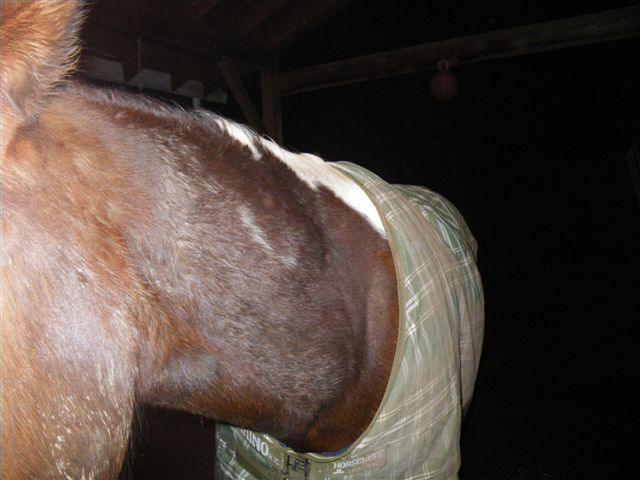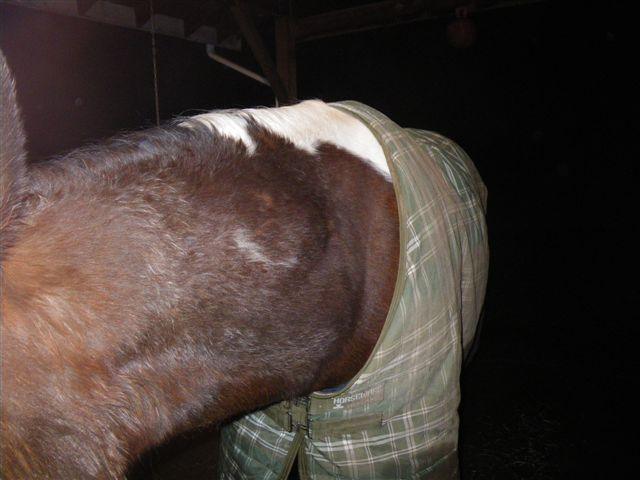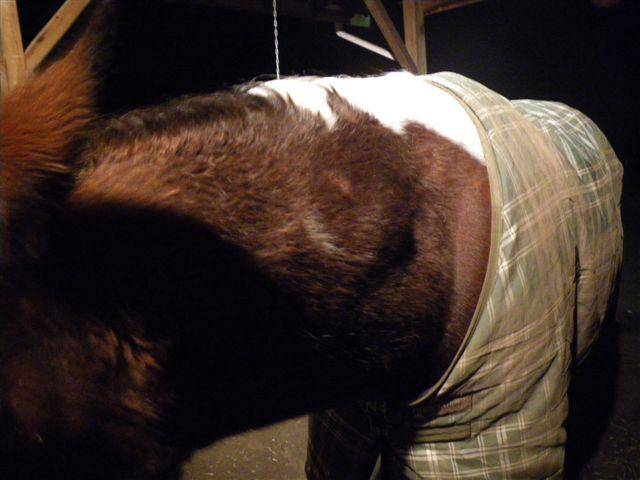Annual Horse Vaccines
by Debora Johnson
This is an excellent article from theHorse. It gives tons of information on pertinent information concerning equine vaccines: Infographic: Vaccinating Your Horse 
Horse Vaccination Basics/Learn how vaccines work, which ones your horse should have, and reactions to watch out for with Dr. Dale Brown of Rood & Riddle Equine Hospital in Lexington, Ky.! 
New: Lyme Disease Vaccination: - Not a core vaccine, however, important information to know on Lyme Disease Vaccine: Lyme Disease/Horses and Humans Many equine vets are now offering Lyme Disease Vaccination for horses in areas where Lyme Disease is known to be endemic. This vaccination is actually made for dogs. The efficacy and safety are not yet known in horses because the FDA has not yet given approval for horses. However, there is evidence that it is probably safe and effective. Your vet and you must determine if this is a vaccine that should be given to your horse. It is NOT recommended for horses who have or have had Lyme Disease.
Spring and fall are the two seasons when our horses get routine medical attention. At these two seasons a series of shots (vaccines) are given and sheath cleanings and teeth floatings are usually done. Often a wellness check is performed while the vet is visiting your horse. The following is a list of possible spring shots that will be given:
- Wellness Exam - The vet checks your horse all over: heart, respiration, lungs, eyes, nose, teeth, coat, legs, feet, general appearance, etc. It is sort of like a complete physical without the blood work.
The neonate and young, growing horse can experience rapid changes in their health status, especially in their musculoskeletal systems. Your vet should perform frequent wellness exams on the young, growing horses. Foals are often seen at 12 to 24 hours, 4 weeks, 4 months, 5 months, 9 months, and 10 months of age during their first year of life. This schedule permits proper neonatal care, timely recognition of angular limb problems, and effective immunization against relevant infectious diseases. "Given the limited time window of surgical opportunity, early recognition of developmental orthopedic disease (DOD) is a priority...any evidence of joint effusion (fluid escape into the joint), lameness, tendon contracture, or angular limb deformity is promptly noted and investigated with further diagnostics. When appropriate, such conditions are treated surgically and/or via farrier care in collaboration with the veterinarian's input. Conditions such as umbilical hernias and retained testicles can be monitored for satisfactory improvement or the need for surgical repair." Harry Werner, DVM
Core Vaccines
Every horse, if possible, even the backyard pet that rarely leaves the farm, should receive the core vaccines, which are tetanus, Eastern/Western Equine Encephalomyelitis, West Nile Virus, and Rabies. In the case of one of my horses, he is unable to get the West Nile Virus shot as he has had major reactions from it. Sometimes the risk has to be considered and discussed with your vet.
- Equine Flu Equine Flu "FLU AVERT" - Intranasal Influenza vaccine. "IM INFLUENZA" - Intramuscular Influenza vaccine. An intramuscular shot can be given instead.
- 3-in-1 or EWT (East/West/Tet) Intramuscular Eastern Western Encephalitis and Tetanus vaccine.
- Tetanus - Tetanus is an infectious disease that is the result of a toxin produced by the bacterium clostridium tetani. This bacterium can enter a wound. The vaccination is a modified toxin that stimulates an immune response. The first time a horse is vaccinated two shots are required. The second dose is given four to six weeks later. After the initial round only a buster shot is required, annually. If you fail to re-vaccinate on a yearly basis, you must administer two doses as if you are initially vaccinating the horse.
- Eastern and Western Encephalomyelitis - This viral disease is transmitted by the mosquito. The vaccine is a combination of killed viruses. Initial vaccination is followed by a second dose in two to three weeks or four to six weeks, depending on vaccine used. An annual re-vaccination is given thereafter. If vaccinated properly and at the correct time of year, the vaccine will protect your horse for the season.
- Rabies - This vaccine contains a killed virus to protect against this rabies. The disease affects the central nervous system and results in death. Rabies has been on the rise lately and can be transmitted from horse to horse and horse to human. This vaccine is given once a year. I give it to our horses in the Spring.
Without a cure, rabies prevention becomes crucial. Vaccination of companion animals against rabies, including horses, cannot be overemphasized. All horses are potentially at risk and should be vaccinated. Bats, skunks, raccoons and fox are the major mammals that put your horse at risk for rabies. However, any mammal can contract rabies. It is important to know, however, that a rabies vaccination does not give 100% protection. Consider these points in regards to vaccination:
- The incidence of rabies in both wild and domestic animals is on the rise.
- It is not uncommon for pastured or stalled horses to be unknowingly exposed to wildlife.
- Most exposures are not noticed and most bite wounds are not found.
- There is significant and serious potential for human exposure from an infected animal.
- Equine rabies cases are invariably fatal.
- Vaccination of horses against rabies is safe and generally highly protective.
- In some states if a horse is found to have rabies all humans who have come in contact with that horse have to receive rabies shots. They can be quite painful and carry risks as well.
- Proven effective in horses and foals age 4 months and older.
- 14-month duration of immunity.
- 97.7% reaction free.
- One dose for primary immunization.
"...Modern vaccines are very effective in providing rabies immunity. The American Association of Equine Practitioners has recently listed rabies as one of the 'core vaccines' that should be given to all horses. Current recommendations are to begin immunization when a foal reaches 6 months of age, then follow with a booster dose in four to six weeks. Horses should then receive boosters at annual intervals starting at 10 to 12 months of age. Broodmares should be vaccinated four to six weeks prior to their delivery dates. Most state health departments mandate that the vaccine be given by a licensed veterinarian who will keep detailed records on the vaccination history of the horse."
Newer DNA vaccines that are now used in horses for West Nile disease, and have been studied for use in equine rabies, may hold promise for better protection in the near future against rabies.
- Strangles "PINNACLE" - Intranasal Strangles vaccine. "IM STRANGLES" - Intramuscular Strangles vaccine. I have my horses given an IM in the neck.
- Potomac Horse Fever or PHF
- Rhino/Flu - "FLU/RHINO"
- Intramuscular Influenza and Rhinopneumonitis vaccine. Rhino/flu combination vaccine is a vaccine containing influenza strains and rhinopneumonitis
EVH 1 and 4
 . This combination vaccine is often given to horses. Show horses, race horses, or horses in a high-exposure situation may need rhino/flu vaccines every three to four months. Sometimes large boarding stables or stables who buy, sell, and board will also give Rhino/Flu 3 or four times a year. I USE to give our horses Rhino/Flu in the Spring and then again in the Fall. My horse, A Patchy, has always had a slight reaction to this shot. Because of that we premedicated him with bute and also gave him trihist the night before the shot and continued to give the trihist depending upon the reaction. This spring, A Patchy had a large localized reaction to the shot. We gave it in his neck, as always, and his neck blew up with a lump the size of a grapefruit. No kidding! I have provided you with pictures below. He is fine, but it took a week for this swelling to go down. He was never in any visual distress. His eating was fine and he was not listless or showing any other signs He did not spike a fever or run a low-grade fever. There was just heat and swelling. I will not give him the shot anymore. Also, I want to add that my husband's horse, Rusty, will not be receiving the shot either. Through my research for HorseHints, I found that horses with uveitis or neck threadworms (Onchocera), (Microfilariae), should probably not have the shot, as well. The shot has been shown to cause a flare-up of uveitis in some of these horses. . This combination vaccine is often given to horses. Show horses, race horses, or horses in a high-exposure situation may need rhino/flu vaccines every three to four months. Sometimes large boarding stables or stables who buy, sell, and board will also give Rhino/Flu 3 or four times a year. I USE to give our horses Rhino/Flu in the Spring and then again in the Fall. My horse, A Patchy, has always had a slight reaction to this shot. Because of that we premedicated him with bute and also gave him trihist the night before the shot and continued to give the trihist depending upon the reaction. This spring, A Patchy had a large localized reaction to the shot. We gave it in his neck, as always, and his neck blew up with a lump the size of a grapefruit. No kidding! I have provided you with pictures below. He is fine, but it took a week for this swelling to go down. He was never in any visual distress. His eating was fine and he was not listless or showing any other signs He did not spike a fever or run a low-grade fever. There was just heat and swelling. I will not give him the shot anymore. Also, I want to add that my husband's horse, Rusty, will not be receiving the shot either. Through my research for HorseHints, I found that horses with uveitis or neck threadworms (Onchocera), (Microfilariae), should probably not have the shot, as well. The shot has been shown to cause a flare-up of uveitis in some of these horses.
  
- West Nile Virus - "WEST NILE" - Intramuscular West Nile Virus vaccine.
Note: One of my horses had very bad reactions to Ft. Dodge vaccines. He reacted badly to the West Nile Virus injection and to the Rhino Flu injection. If you have this problem two other manufacturers were given to me. Many vets will not order single dose shots because they get orders of 10 shots at a cheaper rate. They may also feel more comfortable with a vaccine that they are use to using. Whatever the reason, you may find yourself having to address this problem on your own. Suggestions: You can, however, order your own injections from Valley Vet Supply  . They will overnight the vaccine to you--it must be refrigerated. Vestra is what they have and is made by a reputable manufacturer. Another brand is Murial . They will overnight the vaccine to you--it must be refrigerated. Vestra is what they have and is made by a reputable manufacturer. Another brand is Murial  . I have located a local vet who uses the murial brand of the West Nile Virus vaccine. I suspect A Patchy will do fine with that different manufacturer. He will be getting his shots the end of March and I will upload the result. I might add that we do give him bute for two days before the injection and one day after the injection. Some people will premedicate with banamine or trihist. Always check with your vet first. West Nile Virus is prevalent in our area and is a deadly disease. This shot is not an option for my horses. I do not give the Rhino Flu to my reactive horse anymore. The barn is stable, no horses coming and going. Also the three horses are all geldings. I have opted to not plague him with this shot. If he gets this disease it is not deadly and is treatable. . I have located a local vet who uses the murial brand of the West Nile Virus vaccine. I suspect A Patchy will do fine with that different manufacturer. He will be getting his shots the end of March and I will upload the result. I might add that we do give him bute for two days before the injection and one day after the injection. Some people will premedicate with banamine or trihist. Always check with your vet first. West Nile Virus is prevalent in our area and is a deadly disease. This shot is not an option for my horses. I do not give the Rhino Flu to my reactive horse anymore. The barn is stable, no horses coming and going. Also the three horses are all geldings. I have opted to not plague him with this shot. If he gets this disease it is not deadly and is treatable.
- Pneumabort K-1B
 - "EHV 1" - Intramuscular Viral abortion vaccine. This vaccine is given to pregnant mares at the fifth, seventh, and ninth months of pregnancy. Pneumabort K-1B is the only rhinopneumonitis vaccine with federal approval for the prevention of abortion in mares due to equine herpsevirus-1 {EHV-1}. The EHV-4 initial vaccination is followed by a second dose in four to six weeks, boostered every three to four months for horses that are showing heavily. The vaccine provides protection for up to three months. - "EHV 1" - Intramuscular Viral abortion vaccine. This vaccine is given to pregnant mares at the fifth, seventh, and ninth months of pregnancy. Pneumabort K-1B is the only rhinopneumonitis vaccine with federal approval for the prevention of abortion in mares due to equine herpsevirus-1 {EHV-1}. The EHV-4 initial vaccination is followed by a second dose in four to six weeks, boostered every three to four months for horses that are showing heavily. The vaccine provides protection for up to three months.
- Coggins EIA
Other possible vaccines. Check with your vet to see if any are necessary for your horse: Equine Protozoal Myelitis, Equine Viral Arteritis  , Botulism, Rotavirus , Botulism, Rotavirus
- Fecal Check - I always have a fecal done on my horses in the Spring to determine the parasite load. I also have one done in the Fall, as well, to check for tape worms as well as other worms. If the load is heavy I can do a Panacur Pack to kill off the large load.
- Equine Screen/CBC - CBC in One Easy Lesson
 I do not do this unless there is some suspected problem that would indicate a CBC. But, often times checking the blood can help to determine what a horse's problem might be. I do not do this unless there is some suspected problem that would indicate a CBC. But, often times checking the blood can help to determine what a horse's problem might be.
*A horse's teeth continue to grow throughout its lifetime. Uneven teeth can cause a horse to loose weight because food is not chewed properly and is lost. Often you can see grain falling out the sides of their mouths when they chew. Eating hay and grass can also become a problem. Teeth problems can cause other troubles with your horse's health, as well as bad habits such as head tossing.
For More Information:
Teeth Floating
Teeth
Equine Dentistry
|


